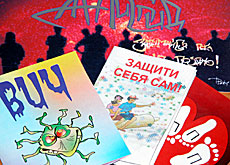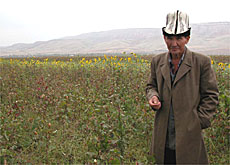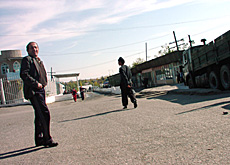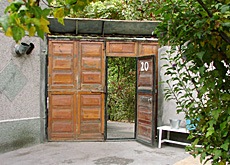Swiss fund aims to break Aids taboo in Kyrgyzstan

Swiss-supported programmes in the south of Kyrgyzstan are helping in the fight against Aids, prostitution and a flourishing drugs trade.
The city of Osh, famous for its 3,000-year-old bazaar, has become a crucial trade route for people traffickers, and drugs from nearby Afghanistan.
The Swiss-funded “Rainbow Centre” in Osh is one of several groups involved in tackling social problems that have flourished in recent years.
Fatima Koshokova, the group’s coordinator, says the Rainbow Centre specialises in educating school children about the dangers of Aids.
“Our mission is to decrease the vulnerability of young people to sexually transmitted diseases and drug abuse,” Koshokova told swissinfo.
The group visits schools throughout Kyrgyzstan’s south, helping to raise awareness and distribute condoms.
Abstinence first
Dilshad, a 22-year-old employee at the centre, says his priority is to teach students about the benefits of abstinence.
“Abstinence is the main goal, but if they decide to become sexually active, I try to convince them to use condoms,” Dilshad says.
Dilshad says there is considerable demand for information about Aids and sex-related issues among young people.
“In our culture we can’t speak about it with our parents, or even our brothers,” he says.
The number of people suffering from Aids has surged in Kyrgyzstan since the late 1990s.
According to official estimates, the number of registered Aids patients remained stable throughout the 1990s, with less than 30 cases recorded each year.
But since 1999, this number has risen fast. In 2002, 362 cases were reported.
Sex trade
Helping drive the increase is a flourishing sex trade in southern Kyrgyzstan.
Abdiraimov Taalai, who heads up an outreach service for sex workers, told swissinfo that organised prostitution had grown in recent years.
“If we compare it to 1999, the number of pimps has increased. Before there were just six, now there are dozens. There are pimps everywhere,” says Taalai.
“Some are well organised and recruit young girls from Uzbekistan and Tajikistan.”
Taalai’s organisation – which is called “Bedruga” (Russian for “girlfriend”) – tries to educate sex workers about how to protect themselves.
Building trust
“Pordruga” established in 1998 by Médicins Sans Frontières, also organises healthcare for sex workers, providing them with free Aids tests.
“When we started, the girls saw our car and ran away because they thought we were the police,” Taalai said.
“And then we started to explain who we are. That we’re here to talk openly, hand out condoms and give advice,” he said.
“Slowly we built trust and now many girls in the streets, saunas, hotels and dormitories we visit look forward to our arrival.”
swissinfo, Jacob Greber and Philippe Kropf in Osh, Kyrgyzstan
“Podruga” and the Rainbow Centre are NGOs established in 1998 by Médicins Sans Frontières.
In 2002, 362 Aids cases were reported in Kyrgyzstan.
The Rainbow Centre visits schools and gives Aids awareness seminars and distributes condoms.
“Podruga” is an outreach service for sex workers.

In compliance with the JTI standards
More: SWI swissinfo.ch certified by the Journalism Trust Initiative












You can find an overview of ongoing debates with our journalists here . Please join us!
If you want to start a conversation about a topic raised in this article or want to report factual errors, email us at english@swissinfo.ch.